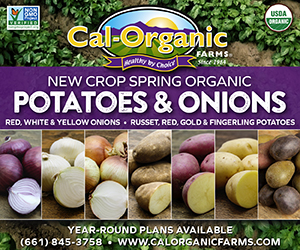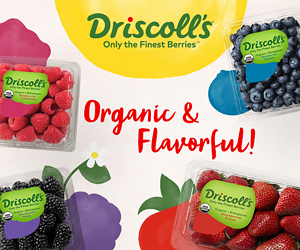Covilli, an organic veg and fruit grower-shipper based in Arizona and Mexico, has been offering Fair Trade Certified produce since 2016—and from the very beginning, the company has taken a unique approach.
Alex Madrigal, Covilli’s President, said that Fair Trade programs are usually initiated based on buyer interest in a specific commodity being certified. But Madrigal didn’t go that route. Instead, he decided to get all Covilli-grown commodities certified, regardless of whether or not there was customer interest.

Alex Madrigal, President, Covilli Brand Organics
“We made the decision to go all in from the start in order to make a deep impact in the lives of our farmworkers and extended communities,” he said.
The Fair Trade USA program works by assigning a price premium to every pound of Fair Trade Certified produce sold, and those funds are then used by farmworkers for a wide range of projects to benefit themselves and their communities. The premium amounts vary by commodity, and they are not determined until there’s been a request for certification.
“We made the decision to go all in from the start in order to make a deep impact in the lives of our farmworkers and extended communities.” - Alex Madrigal
When Covilli approached Fair Trade USA in 2015 about certifying its growing operation’s full product line, 15 of those items had never before been certified, so Fair Trade USA had to create new premiums for them.
Madrigal said the reason he chose to have all Covilli-grown products certified was because he wanted to make sure the premiums aggregated into a significant amount of money to benefit the company’s farmworkers.

“We’d heard that there were some Fair Trade worker associations that took years to even get $2,000 accumulated because it's a spot buy; it's only the people that are really committed to Fair Trade that ask for it,” Madrigal said. “I wanted to create an impact faster. I wanted our workers to see that this is a real program that could really help them.”
In practice, this means Covilli stickers all its commodities Fair Trade (save for a few from its partner growers), regardless of whether or not a buyer is willing to pay the premiums. If a wholesaler or retailer refuses the additional price, Covilli covers the cost itself, and the buyer still gets the Fair Trade-labeled product. (The only exception to this is if a buyer specifically requests Covilli product without the Fair Trade stickers—and this requires a special order.)
“I wanted to create an impact faster. I wanted our workers to see that this is a real program that could really help them.” - Alex Madrigal
Madrigal estimates that Covilli pays the Fair Trade premiums about 60 percent of the time, while 25 percent of the time wholesalers and retailers cover it. (The remaining 15 percent of Covilli product is sold via special order—to buyers who don’t want Fair Trade-labeled product.)
Making this work financially is a bit tricky, said Madrigal, who noted that in addition to covering the Fair Trade premiums of buying orgs that don’t want to pay them, Covilli also has to pay the 1-cent-per-pound administration fee to Fair Trade USA.

“We spread out the loss across commodities and hope that in any given year we will have one or two commodities that outperform the rest,” he said. “It's one of those things I look at every year with a magnifying glass to see where we lost money, where we made money, if we broke even on a certain thing. So it's definitely a puzzle every single year with the Fair Trade premiums, plus the cost of the certification.”
Currently, Covilli’s Fair Trade Certified items include summer and winter squash, chili peppers, brussels sprouts, tomatoes, green beans, cilantro, tomatillos, Persian limes, and dragon fruit.
If a wholesaler or retailer refuses to pay the Fair Trade premium, Covilli covers the cost itself, and the buyer still gets the Fair Trade-labeled product.
The only commodities Covilli sells that are not Fair Trade Certified are ones offered by its partner growers (organic pineapples, Valencia oranges, lemons, and apples). While he encourages his partner growers to get certified, Madrigal doesn’t mandate it. “It's an involved program that takes effort, time, and more than anything commitment,” he said. “It’s cumbersome. The auditing is so expensive—and it's continual.”
To date, Covilli’s Fair Trade premiums have totaled $1.8 million and have been used by the company’s farmworkers in a variety of ways. In 2019, they established a clinic offering subsidized medical and dental services. They also purchased transport vehicles to help cover the commuting costs of workers.

In addition, Covilli’s Fair Trade farmworker committee instituted a meal program, where workers and their children can get a subsidized breakfast and lunch from a kitchen in a local nursery school.
Most recently, the committee voted to start a farmworker store selling staple items like rice, beans, milk, and bread. “They're going to be purchasing these items with the Fair Trade premiums and then selling them at cost to the workers,” Madrigal said. “They themselves are going to be administrating it. And I think that's great because they’re going to have a better option for food shopping in variety and cost than what’s currently available to them in the area where they live.”
To date, Covilli’s Fair Trade premiums have totaled $1.8 million and have been used by the company’s farmworkers in a variety of ways.
For Madrigal, having a robust Fair Trade program is an important social justice endeavor. “Consumers should be educated on the true cost of food, and I think Fair Trade is part of that,” he said. “I think for the most part, people are used to having their food subsidized—you know, being cheap. And it's not cheap. There are people that work very hard to produce the food that consumers put on the table. So that’s why I believe in the principle of the Fair Trade program. It’s a way to give back and help reward farmworkers for their incredible efforts.”






